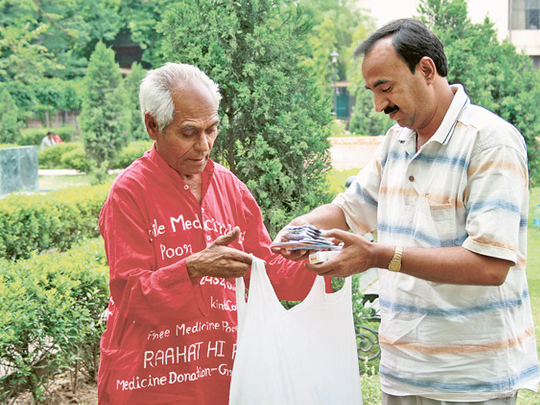
New Delhi: Seventy-year-old Omkar Nath Sharma is on a mission of an unusual kind. He does the rounds in colonies in the city, requesting residents to donate leftover medicines, which he then distributes to poor patients.
His red shirt tells the story. It has his mobile number 9250243298 written both in front and at the back, together with a message that reads, "Mobile medicine bank for poor patients. Contact Omkar Nath. Raahat hi raahat [relief only]. Medicine donation — great donation."
Working as a mobile medicine bank for the last three years, he says: "While medicines worth millions of rupees lie unused at many homes, thousands of poor die untreated because they cannot afford the costly medicines."
Sharma is surprised by the fact that so many people stop taking antibiotics once they recover, even though one is supposed to complete a full course. And then there are others who are sick, in need of medication and can't even afford painkillers.
He starts his day at a government colony. The officials resident here are Central Government Health Scheme beneficiaries, thus entitled to free medicines.
The ‘medicine baba', as he is called by children, goes around asking residents to part with unused medicines in their homes. The process is repeated in colonies throughout the city.
"I go from Alaknanda in South Delhi to even Alwar in Rajasthan," Sharma said.
The appeal for medicines is only the beginning. The process of maintaining records and distributing the medicines is lengthy.
Aware of the fact that he can get into trouble, he systematically prepares a list of all the medicines, injections and syrups he gets and asks for a receipt while collecting these. Having worked as a medical technician in a hospital in Noida, Uttar Pradesh, Sharma says: "I understand medical ethics. It is important to note the expiry date, as it's a matter of peoples' lives."
Distribution
He collects medicines every alternate day and distributes them the very next day.
"I am able to collect drugs worth more than Rs100,000 (Dh8,171) every month. And I donate them to NGOs and individuals alike. But a large portion goes to the government-run charitable dispensary at Dr Ram Manohar Lohia Hospital in Central Delhi," he said.
Aware of noble mission, people now approach him directly, or through doctors who know him quite well by now. His mobile phone is constantly ringing.
When asked what he did for a living, Sharma replied, "People are kind. Some of them help me financially on a regular basis and I am able to concentrate on social work."
He lives in a one-room tenement in Delhi's Palam village with his wife, who is now supportive. Initially, she thought her husband had lost his mind, "begging" for others! His married son met with an accident few years back and is mentally unsound.
What made him work for others, when there were enough family problems of his own home?
"I witnessed an accident at a Metro construction site three years ago. I was moved to see how the poor had to run around for medicines and my future course of life was decided. I found a purpose [for] living and resolved to work for the needy.
"Initially people were [suspicious] of me and [thought that] I was part of some racket that sold medicines. But then people can't be blamed when there is no way to prevent this wastage and redistribution," he said.
"I do not care if some people do not cooperate, for there are many more that care and understand the efforts I make. They make significant contributions."
Incidentally, Sharma was crippled after he met with an accident during his childhood. Originally from Udaipur in Rajasthan, he said: "A vehicle had hit me. Back then, orthopedic surgeries were not that advanced and now I only need to walk, not run around."
Despite his disability, his enthusiasm has not waned and he walks several kilometres daily, making his social service calls.
Need for new system
"With medicines becoming expensive and unaffordable, there is a need to put a system in place so that unused medicines can be collected for the benefit of others for whom they are important," he said.
Sharma is saddened that government-run dispensaries meant to provide free medicines to the poor are closed at night. With hopes of seeing things streamlined, Sharma continues with his mission to society. However, he is concerned about one thing only.
"Please publish my telephone number and address. It could save many more lives," he pleads.
How to help
Contact: Omkar Nath Sharma, B-180, Gali No.4, Manglapuri, Phase - 2, New Delhi - 110 045, India.












